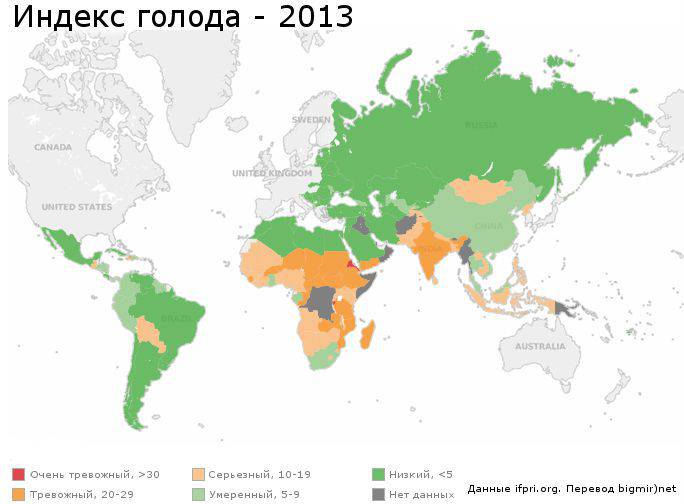Agriculture and food security. Problems and Prospects
In any case, both “truths” are not without reason. And they force you to think again about whether Russia can fully ensure its food security? After all, as a result of the economic reforms of 1990. agriculture and the agro-industrial complex of Russia turned out to be in an unenviable state, and a significant portion of foodstuffs began to be imported from Europe, Asia, Latin America, and even Africa and Australia. But after all, a country cannot make its food supply dependent on food imports. This poses a direct threat to its food security and in the event of political or military conflicts can lead to a sharp deterioration in the food supply of the population, accompanied by rising food prices, food shortages and other negative consequences.

There are nearly a billion hungry people in the world.
Despite the fact that, in general, overproduction of food is more typical for the modern world and every day hundreds of thousands of stores in developed countries “write off” a huge amount of products that are past due for one or two days, there is a shortage of food in the “third world” countries, which turns into hunger. The problem of hunger and in the XXI century is relevant for humanity. Nearly one billion people on the planet get enough food to ensure a healthy lifestyle. First of all, these are residents of the countries of South and Southeast Asia (half of the hungry people of the world) and Tropical Africa (a quarter of the hungry people of the world). According to reports from the World Health Organization, at least one third of children dying in third world countries under the age of five are victims of hunger. The fact of starvation of millions of people testifies to the inability of many states of the world to solve the issues of food supply of their population, at least without humanitarian assistance from international organizations. José Graziano da Silva, Director-General of the Food and Agriculture Organization of the United Nations (FAO), emphasizes that in 2015, the number of hungry people on the planet fell to 795 million, but this is a very high number - because it indicates that every ninth inhabitant of the planet experiencing chronic hunger. Despite the efforts being made, the UN and other international organizations are not yet able to solve the problem of hunger of large masses of the population of Asian and African countries. Although the world produces a significant amount of food, in a number of countries around the world access to food for many categories of the population is not sufficient. There are many reasons for this and they are of economic, socio-demographic, climate-geographical, political nature.
The cause of hunger in the developing countries of South and Southeast Asia is, above all, overcrowding, combined with mass unemployment and the lack of opportunities for states to establish basic social security for the population. In the countries of Tropical Africa, the worst situation is in Somalia, Eritrea, Kenya, Sudan and is associated not only with overpopulation, but also with bloody wars, political instability, climatic conditions that impede the development of agriculture and the production of such amount of food that could meet the needs population. But the risk of hunger today stands not only before the backward countries of the “third world”, but also before the former Soviet republics. It is clear that the republics of Central Asia, Moldova, and from 2014 and Ukraine, are in a very difficult situation, which is associated with economic problems and political instability. But Russia may well face the problem of hunger, which in the 1990s. experienced a real economic catastrophe, accompanied, among other things, by a sharp decline in the level of food supply of the population.
Over the past decade, Russia has become better
The statistics clearly demonstrate the frightening changes that occurred in the period from 1990 to 2001. Thus, meat consumption decreased during this time from 75 to 48 kg. per year, fish - from 20 to 10 kg. per year, milk and dairy products - from 370 to 221 kg. per year per capita. And this is despite the fact that the population of Russia has declined, the number of people with large and very large incomes has increased. The situation began to change only after 2000, when the country's economic situation improved, and at the same time the level of consumption of food by the population began to increase. So, for the period from 2003 to 2012. meat consumption increased to 73 kg. per year - that is, almost reached the late Soviet level, fish - up to 22 kg. per year, milk and dairy products - up to 247 kg. per year per capita.
However, it should be borne in mind that general indicators may not reflect the actual level of consumption of certain foods by specific social groups. In addition, the reduction in the number of population in the period between 1990 and 2015 plays a role. But, in any case, in the last decade, the population began to eat better than in the first ten years after the reforms. However, this does not give grounds to assert about the solution of the food problem in modern Russia. Of course, the overall level of food security in the country has grown significantly - so, according to Natalia Shagaida, director of the Center for Agro-Industrial Policy of the Russian Academy of National Economy and Public Service, the level of food security in the Russian Federation was less than 1999%, and now it is 80 % It turns out that 89% is not able to cover Russia for food needs - and this is not so small a figure. However, the Russian Federation as a whole will be able to cover its food needs, therefore, the predictions of the inevitable famine in the event of any political or economic contradictions are, to put it mildly, exaggerated. Yes, of course, there may be a shortage of certain foods and some inflation, but this will not lead to catastrophic consequences - which, in fact, all modern Russians can see in the European Union countries, the United States and their satellites against the Russian Federation as an example of economic sanctions . The study of the Russian Academy of National Economy and Public Service, devoted to monitoring development trends and identifying threats to the food security of the Russian Federation, reported that the level of food independence of our country is quite high. So, for milk it is 11%, for meat - 80%. Russia can provide itself with pork and chicken itself, but the level of beef supply is very low - Russia produces only 75,9%. At the same time, in such types of products as grain, sugar and vegetable oil, the Russian Federation significantly exceeds the threshold values. This means that it can meet its needs for these types of food in abundance. Russia produces a significant amount of agricultural products that can be exported to other countries. At present, Russia is the third largest grain exporter in the world, that is, it still remains the “global breadbasket”. Russia plays a major role in the export of vegetable oil, since its production, as noted above, exceeds the needs of the Russian population for this product. In addition, Russia exports many unique types of caviar and fish that are not produced or practically are not produced outside of the Russian Federation.

Food safety issues
At the same time, it is necessary to take into account the colossal differences that exist between the regions of the Russian Federation and are due to the climatic, geographical, economic, social, political specifics of particular regions of the country. In particular, a number of regions of the country are characterized by serious problems in the field of food security. First of all, these are such regions as Ingushetia, Kalmykia and Tyva. The economically backward national republics of the Russian Federation are characterized by a low level of food consumption by the population, and local residents are forced to spend considerable money to buy food, but these costs do not contribute to improving the quality of food. This situation is caused by the general socio-economic problems faced by regions with an underdeveloped agro-industrial sector, or that lie outside the main transit routes. The overall level of material well-being of the population, which in the listed republics is lower than the average for Russia, also affects, since they have a high level of unemployment, and wages paid to employees are also low.
In the Doctrine of Food Security, approved in 2010 by the then head of state, D.A. Medvedev, it is emphasized that “food security of the Russian Federation is one of the main directions of ensuring the national security of the country in the medium term, a factor in maintaining its statehood and sovereignty, the most important component of demographic policy, a necessary condition for the implementation of strategic national priority - improving the quality of life of Russian citizens by guaranteeing high life support standards. " The strategic goal of food security is the provision of safe agricultural products. The word "safe" is not used in vain here - in addition to providing the population with sufficient food for a healthy lifestyle with food, the state also addresses the regulation of the quality of manufactured and imported agricultural and agricultural products. It is claims to the quality of products that became one of the reasons for the restrictions imposed on the import of Western products into the country.
The Russian Federation in the field of food security faces a number of certain risks. First, it is the monopolization of agricultural production to large companies and the squeezing of small businessmen from the agro-industrial complex. This threat was particularly actively recalled in the media after the initiative to impose restrictions on personal subsidiary farms of citizens. The proposed restrictions should concern farms that contain more than 5 heads of cattle and 20 heads of small ruminants. According to the project, all owners of farms that have a large number of livestock will have to be registered as individual entrepreneurs. Critics immediately accused the authors of the project in an attempt to destroy small business, to reduce the already low level of material security of the rural population. However, there is nothing strange in the project outlined - on the contrary, the situation when the owners have herds in 1000 livestock heads is not abnormal, but is not registered as entrepreneurs, does not pay taxes, does not pass the required quality control of meat and dairy products and gives out their farms for personal subsidiary farms. Of course, the numbers in 5 and 20 of cattle heads and cattle are controversial, but these figures can be changed, and the fact that the agribusiness sector needs to be streamlined is so obvious. At the same time, the streamlining of control over agricultural production should not lead to real monopolization of agriculture by large companies and oust small and medium-sized entrepreneurs from the agricultural sector. On the contrary, the development and promotion of small business in the field of agriculture is one of the key guarantees of the development of the latter. Grants and subsidies from the state and tax breaks should not be avoided for the farms that are formed - if only the agrarian sector is developing.

Economist OA Glotov in the article “Food security of the Russian Federation: risks and threats, the main directions of state economic policy” lists the main, in his view, risks to Russian food security. First of all, he considers the decline in the investment attractiveness of the domestic economy and the competitiveness of domestic products, as well as the technological lag behind developed countries, unfavorable climatic conditions (which is especially important for Russia, given that a significant part of the country’s territory is characterized by low natural conditions for agricultural development. conditions). In addition, according to Glotov, the low solvency of the population, which causes low demand for food, affects the level of food security in the Russian Federation; insufficient development of the domestic market infrastructure; social polarization of the urban and rural population of the Russian Federation; competitive advantages of foreign products, a number of types of which in a favorable direction differs from the Russian one; reduction of the national animal and plant genetic resources; poor development of innovative technologies in the field of agriculture; weak investment flows in agriculture. Of course, these factors have a negative impact on the food supply of the Russian Federation, however, attention should be paid to such a moment as the ownership of a significant part of food production facilities located on the territory of the Russian Federation to foreign companies. It is impossible not to draw attention to the concentration of part of agricultural production and agro-trade in the hands of representatives of certain ethnic diasporas, which is also a disturbing factor - it’s difficult to say how the representatives of diasporas behave in the event of a political or economic conflict with their country of origin. At least, one should not allow monopolization of domestic agricultural resources by anyone. Equally, this applies to agro-trade.
How to ensure food self-sufficiency?
The report of the Izborsk Club on food security issues of the Russian Federation emphasizes that there are several models of food security. First, it is an autarkic model, implying the self-sufficiency of society in terms of meeting food needs. As a rule, this model was characteristic of most feudal societies, and in the modern period of the world stories to autarkic model, in our opinion, can be attributed to the DPRK. Secondly, it is an imperial model, based on the cheapness of food products imported into the country - the metropolis from the colonies and the countries - satellites. This model was characteristic of the period of the existence of colonial empires (XVIII - the first half of the twentieth centuries) and became a thing of the past as the third world countries decolonized. The third model - dynamic - is the introduction of advanced technologies in the agricultural sector, accompanied by the development of the agricultural industry. This model was characteristic of the entire second half of the twentieth century. Finally, the fourth model is innovative, which, according to specialists of the Izborsk club, is the development of biotechnologies and their use in ensuring the production of environmentally friendly agricultural products. If we apply this classification to the current state of Russian food security, then it is obvious that Russia is still struggling to restore the dynamic model and is trying to switch to an innovative model, however, it faces the consequences of the destruction of agriculture and the agro-industrial sector in the country in the 1990-s and becoming a raw materials appendage West. Meanwhile, without a transition to an innovative model of food security, the Russian Federation will never be able to fully meet the food needs of the population, which means it will be vulnerable to external political and economic pressure.
It should be understood that agriculture is a strategically important sector of the economy, perhaps even more so than industry. Without the development of domestic agriculture, the country's food security will always be low. Accordingly, several fundamental principles must be followed in the management of the agricultural industry. First, the state must assume the main regulatory and even governing role in the field of agriculture. This does not mean that agricultural production should be fully nationalized, but the state should significantly increase its presence in the agro-industrial complex. Secondly, the state should create conditions for the development of domestic agriculture and the agro-industrial complex through subsidies, investments, incentives for agricultural producers. State support is one of the main conditions for the prosperity of the agricultural sector, and in many developed countries of the world the state ensures an acceptable level of agricultural development precisely through grants and subsidies. Third, the state should strive to limit the presence of foreign companies in the food market - especially in the segment of “basic” products, i.e. meat and dairy, grain, vegetable products. At the same time, this does not mean the need to abandon the import of those types of food that are not produced in the country, are scarce or delicious. Finally, the state should develop a set of measures to control agricultural trade, in particular to prevent monopolization of warehousing and trade in certain types of agricultural products, because in a political or economic crisis, the presence of monopolist traders can lead to very dangerous consequences for the country's food security.
Sanctions and food security of the country
However, the implementation of these measures is possible only if the national political elite is really concerned about the future of their state and the issue of ensuring the country's national security is on the priority list. In the case of the domination of the compradors and the puppet elite under their control, it is not possible to ensure the food security of the country - the fates of many Third World countries, whose favorable climatic conditions, nevertheless, did not ensure genuine food prosperity, are examples. Thus, Central American or African states that produced significant amounts of agricultural products on plantations, in fact, cannot provide for their own food needs. This is explained by the fact that each of these countries "specializes" in a certain type of agricultural products, which is exported, and the rest of food products, for the most part, are imported from abroad. Accordingly, transnational corporations and developed Western countries that control world markets gain the ability to fully control the economic situation in these countries and control the policies of these countries through the imposition of sanctions. “Industry specialization” is a sign of the country's belonging to the number of “raw materials appendages” of the rich West. It is not by chance that the phrase “banana republics” has spread in its time as a name for such states - an allusion to the states of Central America in the first half of the 20th century. under the actual control of the United United States Company. Sanctions are not terrible only to those states that were able to create their own autonomous food base, at least in the sphere of producing the most necessary for the life of the population of food products.

At the same time, imposing bans on the importation of imported food in conditions where the country cannot fully provide itself with food, seems to be a manifestation of the disregard of power to the needs of ordinary citizens. Representatives of the elite strata of society, who have the financial ability to travel abroad, can afford to import food and other types of products produced abroad - at least when traveling to other countries. All this turns out to be deprived of ordinary citizens who do not have the means to leave the country. It turns out that the state in the case of an ill-conceived ban on the import of imported food artificially stimulates further aggravation of the social polarization of society, and at the most obvious level - at the level of food consumption. Such measures rather harm the national security of the state, since they contribute to the growth of public discontent with the policies of the authorities, which can lead to the spread of opposition, including radical sentiments. Therefore, on the issue of introducing bans on the import of foreign food, it is necessary to analyze and compare the possible positive and negative consequences of such a decision. It is advisable to introduce bans after new sources have been identified for the types of foodstuffs that have been imposed sanctions. So, for example, a significant part of agricultural products previously supplied by EU countries can be supplied to Russia by countries in Asia, Africa, and Latin America, with which our state maintains acceptable economic and political relations. The Minister of Agriculture of Russia, Alexander Tkachev, claims that Russia itself can cope with the production of those foodstuffs that were previously imported from other states. In particular, the famous Icelandic herring can be replaced by Far Eastern herring produced in Russian waters, and Atlantic salmon supplied from Iceland introduced sanctions can be replaced by deliveries of the same salmon from Chile, with which Russia successfully develops trade and economic relations.
German entrepreneur Stefan Duerr argues that sanctions play into the hands of Russian agriculture, citing as an example the changes in the work of some well-known companies in the agro-industrial market: “The ban on the import of Western food helps the Russian agricultural sector. Recently, the main buyer of Metro in Russia came to me. Previously, domestic products were incredibly difficult to break through to the counters of the Metro store. There was a so-called admission, and the goods themselves were often paid only in two or three months. Meanwhile, Metro is actively seeking Russian suppliers. The company is even ready to finance the development of new products ”(quoted in: Sanctions spurred Russian agriculture // http://www.bragazeta.ru/).
Without a strong village, food security will be under threat
Another problem is closely connected with the problem of ensuring food security of Russia - the socio-demographic crisis of the Russian village. With the beginning of industrialization, the rural population in the country began to decline rapidly. The younger generation of villagers, with the most active, intelligent and talented representatives of it, moved to the cities and chose professions not related to agricultural production. The demographic situation in rural areas has deteriorated since the collapse of the Soviet Union. The agro-industrial complex, as is known, became one of the most hard-hit "victims" of the economic reforms of the 1990-s. Therefore, in 1990-e - 2000-e. outflow of population from rural areas increased. The main reason for migration to the cities was the desire to improve social and living conditions and the unwillingness to engage in heavy and poorly paid agricultural work. The tendency to reduce the rural population is very disappointing, because it confronts Russia with an insurmountable problem - who will work on the land, raise the country's agriculture if rural youth migrates to the cities. Some domestic politicians even thought about replacing Russian peasants with migrants from the countries of near and far abroad. It should be noted that this trend is already taking place in post-Soviet Russia. At least, in climatically favorable areas of the country, enclaves of compact residence of national minorities, which have not previously lived in these territories, have long existed. Thus, diasporas of Meskhetian Turks live in the Rostov Oblast, Krasnodar and Stavropol Territories, in the Krasnodar Territory, Adygea and a number of other regions — Kurds, Yezidis, Hemshilians, and in the Saratov Region — Dungans (Chinese Muslims who came from the Central Asian republics of the former USSR). However, the emergence of ethnic enclaves, especially in those regions where migrants have never lived, are fraught with certain risks. First, it is a potential aggravation of interethnic relations in these regions, caused by possible economic competition between more successful migrants and the indigenous population. Secondly, it is the risk of spreading the political influence of other states, as well as political and religious organizations on the territory of the enclaves. Accordingly, there is a need for more active work of law enforcement agencies and special services in these regions of the country. But, on the other hand, one cannot ignore the fact that many “ethno-anklavy” are quite successfully engaged in agriculture and produce a significant amount of agricultural products that are in demand in the domestic market.

Among the main problems of the modern village that affect the demographic behavior of the rural population are: 1) the low level of wages in agriculture (industry workers remain among the least paid in Russia - of course, we are talking about employees, not farmers); 2) poor social and living conditions in rural areas (lack of communications, poor quality of education and health care, or even the possible lack of medical and educational institutions in a particular rural settlement, lack of leisure infrastructure); 3) low prestige of agricultural labor in post-Soviet Russian society; 4) a high level of moral and moral degradation of the rural population (a village that was once a stronghold of tradition and morality, due to socio-economic processes, degenerates - the crime rate increases, it is senseless and ruthless, and alcoholism and anesthesia increases in rural young people). The neglect of the state to the problems of the village entails further deepening of the socio-demographic crisis in the countryside and, of course, creates serious obstacles to the effective development of the domestic agro-industrial complex. Therefore, the “revitalization” of the Russian village should become one of the most important tasks for the country, the successful solution of which will depend on the solution of other problems, both socio-demographic and food security problems.
What to do?
The Report of the Izborsk Club makes the following proposals to eliminate the threat to the food security of the Russian Federation. Firstly, it is proposed to re-nationalize the land of the Russian Federation and put at the head of land policy the historical traditions of the Russian civilization, combined with modern international practice. In particular, unused agricultural land after a certain period of time must be alienated to the state. At the same time, the tasks of inflowing up to 15 million of working-age population to rural areas of Russia should be solved. Secondly, it is proposed to change the tax and credit policy in the field of agriculture and agriculture-related industries - agricultural engineering, production of mineral fertilizers, agrochemicals. Thirdly, the task of stimulating domestic agricultural production should also be solved by tightening the requirements for imported food. First of all, we are talking about monitoring the presence of components harmful to human health in imported food. Genetically modified products must be quotated, while the requirements for domestic producers of agricultural products must be brought in line with international requirements (they were previously too high, which caused greater benefits from food imports than from their production in the Russian Federation). Fourth, measures should be taken to develop the infrastructure that ensures the growth of agricultural production. We are talking about gasification, electrification, water supply and sewerage, processing plants, road infrastructure in rural areas, because without bringing the village to the state of the infrastructure that is adequate to the modern level of infrastructure development, one can hardly expect a real improvement in the agro-industrial complex. Finally, the regulatory, financial, information, scientific, technological and personnel support of the agricultural sector should be improved.
One can agree with all the proposals of the Izborsk club in the field of agricultural development, but the real possibility of doing some of them leaves many questions. First of all, we are talking about increasing the number of the rural population, especially on such a global scale as 15 million of working-age population who, from nowhere, must come to the countryside. While we do not see the influx into the village, even at a much lower level. Despite the fact that housing prices in rural areas are dozens of times different from urban ones, people are in no hurry to sell urban real estate and acquire housing in rural areas. Even though they may have an impressive amount of the difference in the sale and purchase of housing, for which it is possible to develop their own economy. An increase in the influx of the population into the village is supposed to be solved by means of privileges and increased salaries of rural medical workers and educators. However, doctors, paramedics, teachers, educators - this is one, the more they do not participate directly in agricultural production. Yes, and a special number of young professionals, rushing into the village, is not yet observed - and this despite the housing provided, the normal salary and numerous benefits.
Directly in the field of agricultural production, the situation is even worse - where are you planning to recruit millions of agricultural workers, the same combiners and milkmaids? Even urban laborers are unlikely to go to the village, given the low level of wages in the agricultural sector and the low social prestige of not even agricultural labor, but life itself in rural areas. The word "village" is still used as an insult, they can insult the interlocutor. Accordingly, before setting targets for attracting millions of people to the agricultural sector and to the countryside, it is necessary to make the living conditions of people in the village so comfortable that they do not differ much from the city even in everyday life. First of all, a developed and modern infrastructure should be created at the state expense in the countryside. This is transport accessibility, since many villages in Russia are practically devoid of developed transport links. These are gasification, sewage and water supply of rural settlements, since the level of everyday comfort in rural areas remains extremely low. We should not forget about leisure infrastructure. If in Soviet times, clubs, cinemas were built in almost every village, then in the post-reform period, the vast majority of leisure establishments in the villages became neglected, and it was actually destroyed. Leisure infrastructure in villages should also be brought to a normal state that meets the needs of the modern person. And the most important thing is that in agriculture, normal working conditions should be ensured - from the financial aspect to the development of industrial automation. Agriculture feeds Russia and people working in this industry and living in the countryside should feel their need and relevance, and enjoy the well-deserved respect from the state and society.
- P P 'SЊSЏ RџRѕR "RѕRЅSЃRєRёR№
- http://bm.img.com., http://blogrev.livejournal.com/, https://news.mail.ru, http://vestiregion.ru
Information